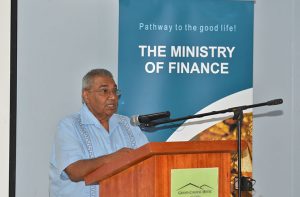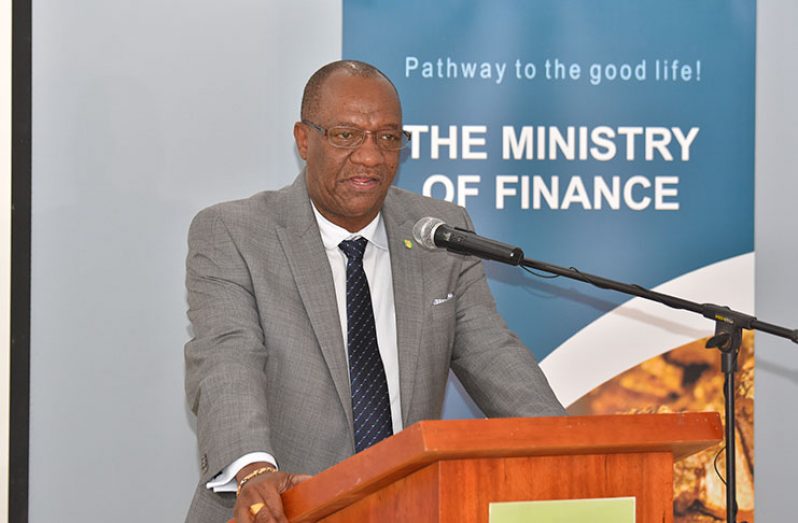…Min Harmon tells senior public servants to ensure gov’t projects are implemented
SENIOR public servants must function in their roles to effectively execute government policies, plans and programmes, Minister of State Joseph Harmon stressed on Monday at the opening of a Public Policy Analysis Management Training Programme, being held at Grand Coastal Inn.
Harmon was at the time addressing Permanent Secretaries, Regional Executive Officers (REOs) and other senior public servants who are participating in the Government of Guyana, Caribbean Development Bank (CDB) training programme.

“Permanent Secretaries and REOs, you are not clerks! You are not clerks… the ministers of the government lay out policy and you are responsible for administration. Do not see yourselves as pen-pushers and paper-pushers,” said the Minister of State.
Harmon reminded the participants that they have an important responsibility to ensure that all projects and programmes identified and have budgetary allocations are executed. “The people of Guyana depend on you; you are not clerks, you are the administrators; you run these things, you plan, design, analyse and execute,” declared the Minister of State.
Last year, Harmon had cause to upbraid senior public servants about their inability to execute projects under the Public Sector Investment Programme (PSIP). However, on Monday, the Minister of State said the PSIP has dramatically improved over the last few months and has attributed that success to Cabinet’s decision to hold monthly mandatory meetings with Permanent Secretaries and key technical personnel within the public sector.
Harmon said his administration recognised the need for the public service to improve the way in which projects are dealt with. He made specific reference to the Green State Development Strategy where several “innovative projects” are being embraced and are to be rolled out soon.
He thanked the CDB for choosing Guyana as one of the three Caribbean territories to participate in the training programme, and noted that Guyana’s PSIP is largely funded by international donor agencies like the CDB. “This developmental partnership has seen Guyana benefitting from various loans and grants administered through the Ministry of Finance. These funds are usually aimed at social and economic infrastructural projects such as schools, public buildings etc.”

The training programme which is part of a four-part project was welcomed by the Minister of State who noted that it is in keeping with the coalition government’s commitment to the creation of a highly skilled, professional public service and building the capacity of the country’s human resource.
Harmon also made reference to the Commission of Inquiry (CoI) held into the country’s public service shortly after his government took office in May 2015. In the Commission’s report specific emphasis was placed on training and staff development within the public service. As such, the Minister of State believes that the CDB training programme plays an important role in the implementation of public policies and the delivery of government’s promise to the people.
“We have inherited several challenges as it relates to the implementation of government’s policies, programmes and projects. Some of these challenges include monies being allocated under the PSIP, which is the government’s main mechanism for development projects and were not efficiently disbursed,” he stated while pointing to the poorly administered contracts some of which were either put on hold or rolled over.
Additionally, there was evidence of some heads of budget agencies being unfamiliar with the new procurement system which was introduced. It was this discovery that lead to Cabinet’s hosting of regular statutory meetings with the PS and technical officers of the Ministry of Finance, to ensure efficient disbursement of public sector improvement programmes, funds and the effective monitoring and evaluation of these projects.
Moreover, the Minister of State noted Guyana’s improvement on the Transparency and Accountability rankings and said that it is as a result of such training programmes. Similarly, Tarachand Balgobin, Director, Project Cycle Management Division outlined the importance of the implementation of the PSIP. Balgobin noted the challenges faced over the years with the design and implementation of the PSIP. He said the Project Cycle Management Division undertook to provide in-field support to the permanent secretaries, REOs and heads of budget agencies – this took the form of what has been termed PSIP clinics.
Thus far, the PSIP clinics have been held at several ministries including the Ministries of Public Infrastructure, Agriculture, Education, and Security as well as the Guyana Defence Force (GDF) to name a few. PSIP training was also conducted in Regions 10, 6 and 5 he told the participants. Balgobin noted that the PSIP must not be seen as an annual expenditure event. “It must be a rolling three-year, short term plan, focusing on investments to capitalise the development agenda of the ministry or sector or region and to add capital stock.”
What it must not do, the Director of the Project Cycle Management said, is to become a glorified maintenance programme void of its investment mandate.
“On the implementation side we drill home three core concepts: no project or programme in the public sector can be implemented without public procurement, hence the imperative to develop a comprehensive detailed procurement plan. The plan must be done in great detail and at a gradual level,” he stated.
Additionally, his department shared its PSIP progress monitoring instrument and established the need for a variance analysis; that is, the deviation or variance from initial plans. “The purpose of the variance analysis is to identify where corrective action or policy decision making in necessary to improve the implementation process,” explained Balgobin, who noted that planning the PSIP and implementing it can only be effectively done in an environment of strong, vibrant and involved public policy analysis and management and project cycle management.

Public policy analysis is designed to teach government officials and public servants to read critically; think analytically and write concisely in all sectors, stressed Balgobin, who pointed to government’s collaboration with the CDB to discuss Guyana’s needs in this regard.
He noted that the training programme is geared towards building a cadre of professionals who are efficient in sound public policy analysis and the planning and execution of strategies and projects.
Meanwhile, Reginald Graham, Consultant Coordinator of the CDB disclosed that through the training provided by the CDB, some 2000 officials are to be trained across the Caribbean with 200 coming from Guyana. The participants benefitted from online courses and are now at phase three of the training programmes which provides for face to face sessions with trainers. Graham said too, that via international procurement processes, the CDB has recruited DODS a training company out of the United Kingdom to assist with the training. Another entity, the Centre for International Development and Training (CIDT) based within the University of Wolver Hampton has also been procured to assist with training in public policy analysis management.



.jpg)








